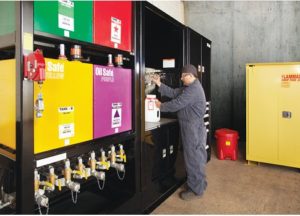Successful Lubricant and Fuel Management
01 Dec 2020, Posted by in Oil Tips A critical factor in every fuel and lubricant-related business’ success is its ability to manage its lubricant and fuel inventory.
A critical factor in every fuel and lubricant-related business’ success is its ability to manage its lubricant and fuel inventory.
Both of these products can be a significant cost to a company when mismanaged and can even lead to theft, overruns, shortfalls, and run-outs, which in turn can cause increased costs and loss in productivity.
Here are five tips that will help you improve your fuel and lubricant management:
Tip #1 – Establish a comprehensive monitoring system
A comprehensive fuel and lubricant management system will include all of the following:
1. Monitoring of purchases – keeping track of these will help you keep an accurate count of the quantity and identity of the lubricants and fuel entering your facility.
2. Keeping track of inventory transactions – Keeping track of these will give you a detailed understanding of the storage and use of the lubricants and fuels that have entered your facility.
3. Inventory Management – good inventory management will help ensure that you always maintain the proper inventory levels needed for production and other important operational processes.
4. Record keeping – proper record keeping will help protect against costly overruns or shortfalls. This component includes maintaining accurate records in the three previous components as well as up-to-date information on material composition, properties, and the latest regulatory and safety information for the lubricants and fuels in inventory.
5. Reporting – through proper record keeping and the other components above, you’ll have the information you need to create informative reports that will inform employees and ensure you and your customers remain up-to-date on the latest industry developments
Tip #2 – Improve communication
There’s no way around it. Communication is one of the most important aspects of maintaining an accurate and reliable lubricant and fuel management system.
The team that runs the program must regularly communicate with each other and make sure that they are all “on the same page” – particularly when it comes to:
– Product names
– Vendors
– Product Numbers
– Bar codes
– System entry
– Distribution
– Product Locations
– And much more!
The bottom line is inconsistent procedures and information can lead to frustrating and very costly mistakes. Communication is the key!
Tip #3 – Limit Access to the management system
Too many users, particularly users who are not that familiar with the program, will only increase inefficiency and the risk of costly mistakes being made.
That’s why you need to restrict access to your fuel and lubricant management system to a select few knowledgeable employees.
Ideally, you would restrict access to only those who are responsible for fuel and lubricant management. The truth is most management programs are not user friendly and allowing new and first-time users to access the program is a recipe for disaster.
Tip #4 – Offer extensive program training
When it comes to operating an accurate and efficient fuel and lubricant management system, the value of good training can’t be overemphasized.
Properly training your employees on the system is a terrific way to eliminate common mistakes and ensure everyone uses the same procedures.
But you must go beyond simply showing your employees how to use the program. You also need to explain why the management program is in place to begin with and how it benefits each of them as well as the company as a whole.
When your employees understand this, they will be much more likely to carefully carry out their responsibilities.
Tip #5 – Check inventory regularly
Let’s face it, mistakes are going to happen. You can implement all the procedures in the world, you can hire only the most careful and conscientious employees, and still inevitably mistakes are going to happen.
It comes with being human. That’s why you need to conduct regular inventory checks to ensure that those small mistakes don’t grow into large, costly errors.
Regular checks will help prevent costly overruns or shortfalls and will keep your database as accurate as possible, which in turn will help prevent wasted time and employee frustration.
Article Source: Ezine
